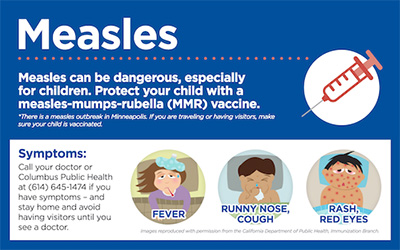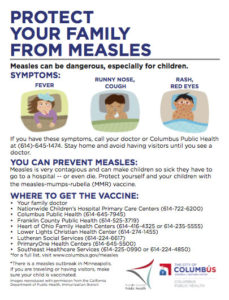What to Know Right Now
-
- As of February 23, 2023, the community measles outbreak in Franklin County is over.
- While the current outbreak is over, the risk of future measles cases in our community is very real.
- It is important to get vaccinated with the safe and highly effective MMR shot. Read below to learn more.
About Measles (Rubeola)
Measles is a highly contagious, serious disease caused by a virus. Measles is caused by a virus in the paramyxovirus family and it is normally passed through direct contact and through the air. The virus infects the respiratory tract , then spreads throughout the body. Measles is a human disease and is not known to occur in animals.
Measles Symptoms
Measles starts with fever, runny nose, cough, red eyes, and sore throat. It’s followed by a rash that spreads over the body. Two or three days after symptoms begin, tiny white spots (Koplik spots) may appear inside the mouth. Measles virus is highly contagious virus and spreads through the air through coughing and sneezing. The best way to prevent measles, mumps and rubella is with the (MMR) vaccine.
Franklin County Public Health offers the MMR vaccine at all of our Immunization Clinics.
Protection: Get Your MMR Vaccine
Measles can be prevented with MMR vaccine. The vaccine protects against three diseases: measles, mumps, and rubella. CDC recommends children get two doses of MMR vaccine, starting with the first dose at 12 through 15 months of age, and the second dose at 4 through 6 years of age. Teens and adults should also be up to date on their MMR vaccination.
The MMR vaccine is very safe and effective. Two doses of MMR vaccine are about 97% effective at preventing measles; one dose is about 93% effective.
Ensure Your Children are Up-to-Date on Immunizations
CDC recommends that children get two doses of MMR vaccine:
12 through 15 months of age
4 through 6 years of age
Teens and adults should also be up to date on MMR vaccinations.
Stay Home When Sick & Talk to Your Doctor
Stay home or keep children
home when ill.
Seek medical attention
for symptoms.
Measles FAQ
Symptoms usually appear 7-14 days after exposure but can take as long as 21 days. The first symptoms are usually:
- High fever
- Cough
- Runny nose
- Red watery eyes
- Rash
- Small red spots, some of which are slightly raised.
- Spots and bumps in tight clusters give the skin a splotchy red appearance.
- Usually appears 2 to 4 days after the fever begins and lasts 5 to 6 days.
- Begins at the hairline, moves to the face and neck, down the body and then to the arms and legs.
A small number of people who get measles will need to be hospitalized and could die. Many people with measles have complications such as diarrhea, ear infections or pneumonia. They can also get a brain infection that can lead to permanent brain damage. Measles during pregnancy increases the risk of early labor, miscarriage and low birth weight infants. Measles can be more severe in people with weak immune systems.
A person with measles can pass it to others from 4 days before a rash appears through the 4th day after the rash appears.
There is no treatment but acetaminophen and ibuprofen may be taken to reduce a fever. People with measles also need bed rest and fluids. They also may need treatment for complications such as diarrhea, an ear infection or pneumonia.
If my child or another family member has been exposed to measles, what should I do?
Immediately call your local health department, doctor or clinic for advice. Never been vaccinated? Get the Measles, Mumps and Rubella (MMR) vaccine within 3 days of being exposed. This may prevent you from getting measles. Some people may need an immune globulin shot -- antibodies to the measles virus. It should be given within 6 days of being exposed. This may prevent or lessen the severity of measles.
We recommend that all children get the Measles, Mumps and Rubella (MMR) Vaccine.
Children should get their first MMR shot at 12 through 15 months old (as soon as possible within this time period). The second dose may be given as soon as 28 days after the first dose. But it is usually given between 4 and 6 years of age.
An early dose of MMR vaccine is recommended for children 6-11 months of age who will be traveling internationally and who are in an outbreak area. These children will still need the 2 routine doses given at 12-15 months and 4-6 years of age to ensure protection. They will receive a total of 3 MMR vaccines.
For pre-kindergarten including day care, Head Start or nursery school: one dose of MMR vaccine
Kindergarten to grade 12: two doses of MMR vaccine
College: two doses of MMR vaccine
Measles is still common in many other countries. Make sure that you and your children are fully vaccinated before traveling out of the U.S.
Children, adults and adolescents should have two doses of MMR vaccine, at least 28 days apart.
An early dose of MMR vaccine is recommended for children 6-12 months of age who will be traveling internationally and who are in an outbreak area. This dose does not count as part of the routine doses given at 12-15 months and 4-6 years of age. These children will need a total of 3 MMR vaccinations.


